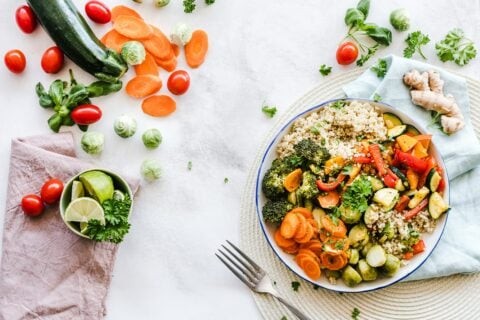Understanding Islamic dietary laws is crucial for anyone interested in Muslim culture, food production, or simply catering to a diverse population. With a significant global Muslim population, knowing What Foods Are Forbidden In Islam (Haram) is essential.
This guide provides a detailed overview of Islamic dietary laws, clarifying what Muslims cannot eat and exploring the significance of Halal certification.
Core Principles of Islamic Dietary Laws
Islamic dietary laws are based on principles from the Quran and Hadith, distinguishing between Halal (permissible) and Haram (forbidden).
- Halal (Permissible): Refers to foods and drinks allowed under Islamic law. To be Halal, food must be free of Haram substances and processed according to Islamic guidelines.
- Haram (Forbidden): Encompasses items explicitly prohibited in Islam. This includes pork, blood, alcohol, improperly slaughtered meat, and offerings to idols.
- Makrooh (Discouraged): Actions or foods that are discouraged but not sinful. Avoiding them is recommended for spiritual and physical well-being.
- Mashbooh (Doubtful): Foods or practices with unclear Halal or Haram status. Muslims are advised to avoid Mashbooh to minimize the risk of consuming Haram.
- Dhabiha (Slaughtered): Specifies the Islamic method of slaughtering animals for consumption, involving invoking Allah’s name and ensuring humane treatment.
Alt text: Halal slaughtering method, Dhabiha, where a Muslim hand is using a sharp knife to cut raw meat on a wooden board.
Detailed List of Haram Foods in Islam
The following table provides a comprehensive list of foods forbidden in Islam, highlighting specific items and their basis in Islamic texts:
| Category | Prohibited Items | Explanation | Quran/Hadith References |
|---|---|---|---|
| 1. Pork and Pork Products | Pork, bacon, ham, gelatin (if from pork), lard, etc. | Pork is explicitly forbidden in Islam. | Surah Al-Baqarah (2:173), Al-Ma’idah (5:3), Al-An’am (6:145) |
| 2. Carrion (Dead Meat) | Animals that died naturally, from disease, or were not slaughtered according to Islamic guidelines | Consuming dead animals is forbidden. | Surah Al-Baqarah (2:173), Al-Ma’idah (5:3) |
| 3. Blood | Blood and blood-based products | Consuming blood in any form is prohibited. | Surah Al-Baqarah (2:173), Al-Ma’idah (5:3) |
| 4. Alcohol and Intoxicants | Alcoholic beverages, intoxicating drugs | All forms of intoxicants are forbidden. | Surah Al-Ma’idah (5:90-91), Al-Baqarah (2:219) |
| 5. Improperly Slaughtered Meat | Animals not slaughtered in the name of Allah or slaughtered improperly | Animals must be slaughtered by invoking Allah’s name. | Surah Al-Ma’idah (5:3) |
| 6. Carnivorous Animals | Lions, tigers, eagles, hawks, any animal with fangs or talons | Carnivorous animals and birds of prey are forbidden. | Based on Hadith (Sahih Muslim, no: 1934) |
| 7. Reptiles and Insects | Snakes, lizards, most insects (except locusts) | Most reptiles and insects are Haram, with specific exceptions. | Based on Islamic jurisprudence |
| 8. Certain Marine Animals | Eels, frogs, shellfish (shrimp, lobster, crab – depending on school of thought) | Varies among scholars; some marine animals are Haram according to certain Islamic schools. | Differences in interpretation of Hadith and Islamic texts |
| 9. Haram Ingredient Products | Processed foods containing gelatin (from non-Halal sources), certain emulsifiers, additives derived from Haram sources, non-Halal flavorings (such as those using alcohol) | Any food products containing Haram ingredients are also forbidden. | Principle based on Islamic jurisprudence |
The Exception of Darura (Necessity)
Under the principle of “Darura” (necessity), if a Muslim is in a life-threatening situation, such as starvation with no Halal options available, consuming Haram food to survive is permissible. This is because preserving life takes precedence over dietary restrictions.
Hidden Haram: Food Additives and Ingredients to Be Aware Of
Certain food additives and ingredients can render food Haram, even if the main components are Halal. Muslims should be aware of the following:
| Ingredient | Common Uses | Halal Consideration |
|---|---|---|
| Gelatin | Candies, marshmallows, yogurts, capsules | Must be from Halal-slaughtered animals or plant-based. |
| L-Cysteine | Bread products | Source needs verification; human or non-Halal animal origins are questionable. |
| Mono- and Diglycerides | Emulsifiers | Requires source verification; plant-based sources are generally Halal. |
| Rennet | Cheese-making | Halal only if the calf was slaughtered according to Islamic law. |
| Alcohol | Beverages, food flavorings, sauces, baked goods | Any trace of alcohol is considered Haram. |
| Carmine | Red dye in cosmetics, candy, drinks | Insect origin typically makes it Haram. |
| Enzymes | Food processing | Halal if from Halal-slaughtered animals or microbial sources; non-Halal animal origins are Haram. |
Alt text: Sweets with potential haram ingredients, showcasing a candy store filled with colorful sweets that may contain non-halal gelatin or carmine.
Navigating Halal Food Options in Non-Muslim Countries
Finding Halal food in non-Muslim majority countries can be challenging, but increasing Muslim populations and demand are expanding options. Here are some guidelines:
- Check for Halal Certification: Look for recognized Halal certification labels on products.
- Opt for Vegetarian Items: Vegetarian or vegan options are often safer choices, but always check ingredient labels for non-Halal components.
- Read Ingredient Labels Carefully: Learn to identify potentially Haram ingredients and be cautious of vague terms.
The Importance of Halal Certification and Labels
Halal certification ensures that food products and consumables meet Islamic dietary guidelines. It covers ingredients, processing methods, packaging, and handling to prevent cross-contamination with Haram substances.
- Comprehensive Ingredient Scrutiny: Every ingredient is examined to ensure it is Halal.
- Beyond Food: Halal certification extends to cosmetics, pharmaceuticals, personal care products, and packaging.
Halal certification builds trust with Muslim consumers and opens new markets for businesses.
Conclusion
Understanding what foods are forbidden in Islam is vital for Muslims and anyone involved in the food industry. By staying informed about Haram substances and seeking Halal-certified products, Muslims can adhere to their dietary requirements with confidence.
Frequently Asked Questions (FAQs)
Q1. What are the main categories of food that are considered Haram (forbidden) in Islam?
A: The main categories include pork and pork products, animals not slaughtered according to Islamic law, blood, alcohol, and any food containing ingredients derived from these sources.
Q2. Is gelatin Halal?
A: Gelatin is only Halal if derived from Halal sources, such as fish or animals slaughtered according to Islamic law.
Q3. What should Muslims look for on food labels to ensure products are Halal?
A: Look for a recognized Halal certification label and check for Haram ingredients like gelatin, alcohol, or lard. Be cautious of ambiguous terms like “natural flavors” or “enzymes.”
Q4. Can Muslims eat meat that has not been slaughtered according to Islamic law if it’s labeled as organic or free-range?
A: No, meat must be slaughtered according to Islamic law (Dhabiha) to be considered Halal, regardless of organic or free-range labels.
Q5. Is alcohol in food or cooking permissible in Islam?
A: No, any form of alcohol in beverages, cooking, or as an ingredient is Haram.
Written by Azmi Anees, Edited by Mohammad Abdullah Hussaini (Vice President American Halal Foundation)
References:
Al Quran:
- Surah Al Bakarah
- Surah Al An’am
- Surah Al Maidah
Islamic Jurisprudence
Research:
- Consumer behavior towards willingness to pay for Halal products: An assessment of demand for Halal certification in a Muslim country
October 2018- British Food Journal 121(9)

